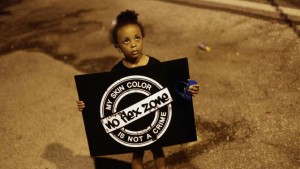
Like The Root’s Diana Ozemebhoya Eromosele, who recently penned the essay“Michael Brown’s Death Reopened My Eyes to My Privileges as a Black Woman,” I understand that, as a woman, I behave differently in public spaces than the black men I know and love. Actually, as an activist who has been involved in various rallies against police violence and “cop watches” in my community, I even have a habit of “mouthing off” to police officers when I know they are behaving in ways that are inappropriate and sometimes illegal.
But as I witness the national response to Michael Brown’s slaying, and how the citizens of Ferguson, Mo., are being terrorized by a militarized police force, I am forced to take a long, hard look at my behaviors and how dangerous they are. The truth is that, although cases of state and racialized violence against black women may happen less frequently than with black men, black women are still constantly perceived as threats by law enforcement and others, and must begin behaving with that awareness.
It’s no wonder that I’m just now coming to terms with this. The message that men are the only ones in danger when it comes to racialized violence is a strong one.
My mother’s conversations with me regarding how to be safe in the world generally centered on my femaleness—how to carry myself to ward off sexual harassment and assault, and which men to trust and which men not to. They were starkly different conversations from those she had with my brother.
She never spoke to me about how the sheer presence of my black skin might cause me to be beaten mercilessly by a highway patrolman; that knocking on a stranger’s door for help might mean himshooting me in the face; that being involved with a man whom police suspect of criminal activity might mean my home being raided, my infant child being injured and me being killed; that my female children aren’t safe from police violence; that, even at the age of 92, I could still suffer death at the hands of the police. My mother, although unintentionally, made a serious parenting mistake.
As I raise my own daughter, I realize that I can’t make the errors my mother did. I have to teach her, as I would teach my son, that the police and random strangers may mean her more harm than good, that she has to be alert and mindful of the way her black body moves.
To aid in teaching her these lessons, I’d like to see more media coverage of cases where black women are injured and murdered by random homeowners and those sworn to serve and protect. I’d like to take her to a rally against police brutality that includes the names of women like Rekia Boyd, Raven Dozier and Ersula Ore. I want her to see herself—hell, I want to see myself—in these fights against violent, institutionalized racism. And I wonder why this isn’t happening already.


